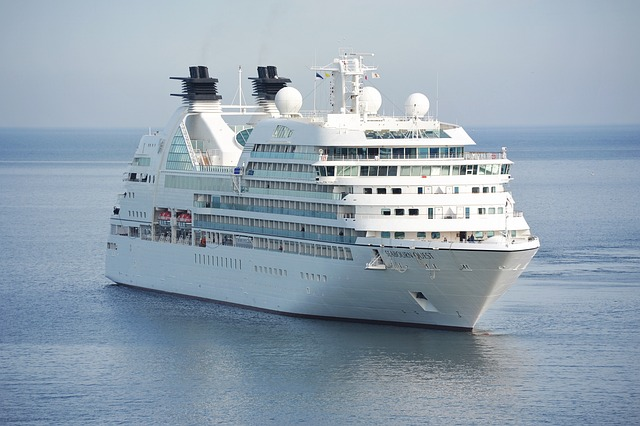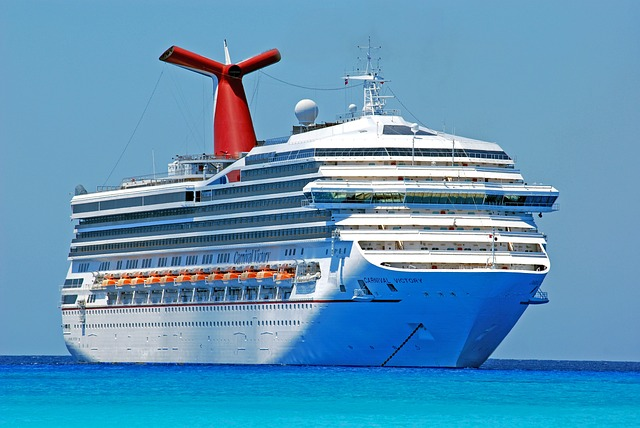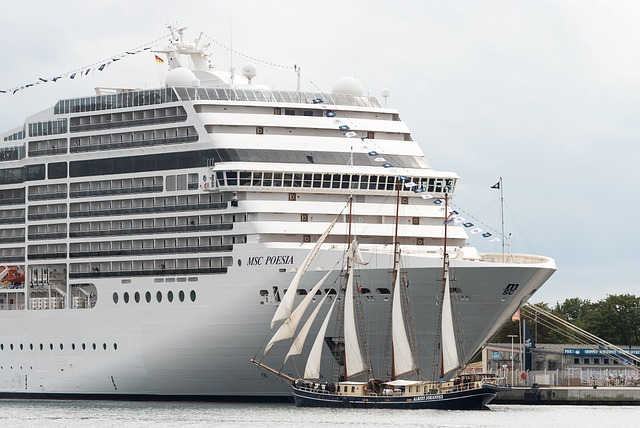Ahoy there, readers! It’s time to tackle a question that might be bobbing around in some of your minds: “Can a felon go on a cruise?” You may be thinking, “That’s a particular query!” But trust me, the relevance of this topic runs more profound than the ocean.
We live in a world that believes in second chances, including felons looking to experience the joy of experiencing an open or closed-loop cruise. This blog will navigate the intricate waters of legalities, cruise line policies, and travel restrictions. So, whether you’re a convicted felon, a parole officer, or a curious traveler like me, this post promises to be as enlightening as the lighthouse guiding ships to their ports. Let’s set sail, shall we?
Understanding The Basics: Felonies and Travel Restrictions
Let’s back up a bit and get down to brass tacks. What is a felony, you ask? In simple terms, a felony is a classification of crimes considered severe. We’re not discussing when you “accidentally” pocketed a hotel towel. Felonies cover the heavy stuff, like armed robbery and other violent crimes.
As a result of such transgressions, felons are often left juggling a series of travel restrictions. While some countries might wave them in like enthusiastic spectators at a ship’s sail away party, others may not even let them past the gangway. It can be as unpredictable as the ocean itself.
Typically, these travel restrictions include being denied entry to certain countries, having to navigate complicated visa requirements and a general unease when traveling due to the potential of facing unexpected legal issues. So, the question arises – can a felon board a glorious cruise ship and set sail into the sunset? Well, stick around because we’re about to dive into that very topic.
Can a Felon Go on a Cruise?
To answer the question hovering like a seagull around a fisherman’s bucket: Yes, a felon can go on a cruise! But before you rush off to book that Royal Caribbean cruise, there are a few ‘buts’ to consider.
While most cruise lines, including big players like Carnival Cruise and Disney Cruise, don’t explicitly state that felons are barred, the real challenge often lies in the ports of call. The itinerary may include several countries, each with its entry requirements. Depending on the nature of the felony, some countries might roll out the red carpet, while others might show you the red light.
The type of cruise you plan on going on also comes into play, and each has its requirements. Every situation is unique as a sunset on the open sea, so it’s always a good idea to consult with your parole officer, a legal professional, or a knowledgeable travel agent before making any plans. After all, it’s better to be safe than sorry, especially when enjoying your dream cruise vacation!
Types of Cruises and Their Required Documents
Closed Loop cruise
You might be wondering what a “closed loop cruise” is, right? Well, let me demystify it for you. A closed-loop cruise is a voyage that begins and ends at the same port in the same country. This sort of cruise feels like a round trip where you end up where you started. There’s good news if you’re considering closed-loop cruises, such as a trip to our friendly neighbor Canada, tropical Mexico, or exploring Alaska.
For US citizens, these cruises typically don’t require a passport. Instead, you need proof of citizenship, like an original or certified copy of your birth certificate, and a government-issued photo ID, like a driver’s license. “But what about my passport?” you might ask. Having one is always a great idea, but not mandatory for these journeys.
Open Loop cruise
On the other hand, there’s the adventurous, boundary-breaking “open loop cruise.” This type of cruise begins at one port and ends at a different one, usually in a foreign country. Imagine starting your journey in sunny Miami and ending in picturesque Vancouver.
Open loop cruises expose you to different cultures, various ports, and, yes, multiple destination ports with different entry requirements. As an explorer on an open-loop cruise, you will need a passport as you leave the country. Upon your return, be prepared to say ‘Hello!’ to the friendly folks at Customs and Border Protection.
Just remember, whatever type of cruise you choose, it’s best to double-check the required documents with your chosen cruise line. Because let’s face it, nobody wants to be left at the dock waving goodbye because of a paperwork mix-up.
Restricted Ports: Countries that Ban Felons
While most countries welcome tourists with open arms, certain nations might have restrictions for travelers with a criminal history. Yes, you read that right. Some countries may deny entry to individuals convicted of a felony. For example, countries like Australia, Canada, New Zealand, and the United Kingdom are known to have strict immigration laws concerning felons.
But how do they enforce these laws? The answer lies in international data sharing and border control measures.
How do These Countries Know if you Have a Criminal Record?
It’s all about data sharing. The United States shares criminal record information with other countries through various international law enforcement agencies. When you arrive at a foreign port, your passport may be scanned, and your information is run through international databases that include details about criminal histories.
Countries like Canada have access to the US National Crime Information Center (NCIC), which shares criminal record data. As a result, Canadian authorities can see US criminal records and make decisions about your eligibility to enter based on their immigration laws and your criminal history.
If you are a felon and planning to cruise to a country with restrictions, checking the entry requirements with the embassy or consulate is always a good idea. Be aware of the law and respect the immigration rules. And remember, despite these restrictions, over 2000 ports worldwide still welcome everyone, regardless of their past.
Cruise Line Policies on Felons: A Detailed Review
Many felons wonder whether they can participate in cruise vacations, and the answer largely depends on the policies of individual cruise lines. While some cruise lines may not have specific rules regarding felons, they all have rules about the necessary travel documents passengers must have. And in case the necessary documents are denied due to the felon status, a cruise line cannot allow the individual to board. Let’s look at some of the major cruise lines and their policies.
Carnival Cruise
Carnival Cruise is one of the most significant cruise lines worldwide. Per their policy, felons have no direct prohibition to take a cruise. However, felons must adhere to the visa and documentation requirements of each country the cruise ship is visiting. They also suggest checking your eligibility to enter Canada and recommend a waiver of exclusion if required.
Disney Cruise
Disney Cruise Line, popular among families and children, does not bar anyone based on their criminal background. No matter the offense, a felon can go on a Disney cruise. Of course, this comes with the caveat that the individual must possess all the required documents and visas to visit any ports on the itinerary.
Royal Caribbean
Like Disney Cruise Line, Royal Caribbean does not prevent anyone from booking a cruise based on their criminal record. Again, the key requirement is having the appropriate travel documentation and meeting visa requirements for the countries included in the voyage.
Cruise Lines and Passport Cards
Cruise lines also differ in their acceptance of passport cards as a form of identification. Some, like Carnival and Royal Caribbean, accept passport cards, but it’s best to check with the cruise line beforehand to avoid confusion or issues.
So cruise lines do not directly restrict felons from boarding their ships, but issues can arise due to the travel restrictions and documentation requirements of the countries they plan to visit on cruise ships.
Preparation and Application: Steps for a Felon to Travel on a Cruise
Traveling on a cruise as a felon may seem daunting due to the various requirements and potential restrictions. However, it is entirely possible with careful preparation and a thorough understanding of the process.
Here’s a step-by-step guide to help:
Step 1: Identify the Cruise Line and Itinerary
Before anything else, determine the cruise line you want to travel with and the specific itinerary you’re interested in. This will dictate the necessary travel documents and the countries you must check for possible restrictions.
Step 2: Check the Visa and Entry Requirements
Once you know the countries on your itinerary, check each one for its visa requirements and entry restrictions, especially for felons. This can often be found on the country’s consulate or embassy website. Alternatively, you can use the visa requirement links the cruise line provides.
Step 3: Apply for Necessary Travel Documents
Ensure you have a valid ID, such as a driver’s license and an original or certified copy of your birth certificate. If you don’t have a passport and your cruise is open-loop (meaning it visits ports in different countries), apply for one. Be aware that you may be denied a passport if you owe child support above a certain amount or are on probation or parole.
You may be eligible for a passport card if you can’t get a passport. This is valid for land and sea travel to Canada, Mexico, Bermuda, and the Caribbean but not for European port entry. Ensure the cruise line you’ve chosen accepts passport cards if you’re considering this option.
Step 4: Apply for Necessary Visas
If any countries on your itinerary require visas, apply for them well in advance. Some visas can take weeks or even months to process.
Step 5: Check for Restrictions in Each Port
Research the law in every port you will visit. Some ports may have restrictions for felons, so it’s crucial to be aware of these and plan accordingly. If a port denies entry to felons, check with your cruise line about available options. You may be able to stay on the ship while it’s docked at that port.
Step 6: Consult with Your Probation/Parole Officer
Consult your officer before booking a cruise if you’re currently on probation or parole. Traveling out of state or country may be prohibited under the terms of your probation or parole.
Step 7: Book Your Cruise
Once you’ve done all the above and are confident you can meet the requirements, you can book your cruise. Ensure that your passport or passport card, if applicable, is valid for at least six months beyond the duration of your cruise.
Tips and Advice for Successful Cruise Travel as a Felon
Traveling as a felon, especially on a cruise, may involve extra planning and preparation. Yet, you can have an enjoyable and hassle-free experience with a mindful approach.
Here are some valuable tips to consider:
Research Is Crucial: Information is your friend. Make sure you understand the specific requirements of your chosen cruise line and the countries you’ll be visiting. Make a checklist of all the documents you’ll need and the steps you must take before your trip. Check regularly for updates, as travel restrictions and requirements can change.
Begin Your Preparations Early: Some aspects of travel preparation, such as obtaining a passport or visa, can take time. Begin preparations as soon as possible to avoid last-minute stress and potential complications.
Be Transparent with Your Cruise Line: If you have a felony record, it’s best to be upfront with your cruise line about it. They can provide you with guidance and help you navigate any potential challenges that might arise.
Stay Informed About the Law: Laws vary from country to country, and you must be informed about the legalities in every port you visit. You should especially be aware of any restrictions or regulations related to your criminal record.
Be Prepared for Additional Scrutiny: As a felon, you might be subject to additional scrutiny at borders or by cruise line security. This can include more detailed searches or questioning. Be prepared for this and cooperate fully with any requests.
Connect With Others: Reach out to felons who have successfully traveled on a cruise. They can provide first-hand advice, tips, and potentially helpful contacts. Online forums or support groups can be a good starting point for making these connections.
Consider Professional Assistance: If the process seems overwhelming, you might consider hiring a professional or a travel agent who is experienced working with travelers with criminal records. They can guide you through the process and help ensure nothing is overlooked.
A criminal record shouldn’t prevent you from enjoying life’s experiences, including travel. You can have a successful cruise travel experience with due diligence and the right approach. One felon who successfully embarked on a cruise says, “The key is to be informed, be prepared, and never let your past define your future.”
Conclusion
Navigating a cruise as a felon might seem challenging, but it’s entirely possible with careful planning and adherence to regulations. We’ve explored cruise types, travel restrictions, cruise line policies, preparation steps, and tips for a smooth journey. While past mistakes may present unique challenges, remember, they needn’t prevent future explorations.
Every individual deserves a chance to enjoy a vacation, regardless of their past. With diligence and a positive outlook, felons can embark on an exciting cruise adventure, experiencing the world from a refreshing vantage point. Keep moving forward, and let the sea usher in new horizons.
FAQs
Does Royal Caribbean allow felons?
Yes, Royal Caribbean does allow felons to travel on their cruises. They do not have specific restrictions based on a person’s criminal record. However, felons must comply with the travel documents and visa requirements for the countries they will be visiting during the cruise. It’s always advisable to check with Royal Caribbean directly for specific guidelines or regulations.
Can you go on a cruise to the Bahamas with a felony?
Yes, felons can take a cruise to the Bahamas. The Bahamas shares a common border with the United States, so this would typically be a closed-loop cruise. Such cruises have fewer requirements for passports and documentation. However, checking with the cruise line for any specific restrictions or requirements is advisable.
Can felons go on a Carnival cruise?
Yes, felons can go on a Carnival Cruise. However, they must adhere to the visa and documentation requirements of each country the cruise ship is visiting. It’s always recommended to confirm with the cruise line about any specific rules or restrictions before booking. Remember, proper documentation is critical to ensure a hassle-free travel experience.







